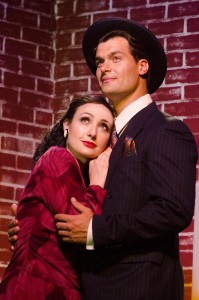
As 2nd Story Theatre closes in on the final weekend of its charming, melancholic take on Truman Capote’s Breakfast at Tiffany’s (by way of Richard Greenberg’s taut adaptation of the original novella), a transformation is taking place. Upstairs, Holly Golightly is sweetly fast-talking her way into our hearts, while, in the basement, the bones of the building’s foundation are laid bare, ready for a new identity and a new chapter in the venerable Warren theater’s history. Apt, that, as Capote’s tale of an impoverished hillbilly girl who recreates herself every other minute, mirrors the purposeful destruction and rebirth taking place underneath. As the first of two throwbacks of a sort (Bell, Book and Candle is up next, another mid-century period piece that curiously also features a cat in the script), Tiffany’s is a hot ticket for 2nd Story at a notoriously tough time to get audiences to see anything but the frothiest of comedies.
The plot of Breakfast at Tiffany’s is well known, and all but the most casual observers will know that Capote’s original source material is somewhat different than the eventual film version that became an archetypal triumph for Audrey Hepburn. The play hews much closer to the novella, and therefore has an undercurrent that presents more as an autobiographical statement for Capote than as a star vehicle for Hepburn (whom Capote notoriously disliked in the role, favoring Marilyn Monroe for the part). The play takes place in the late ’50s, but spends most of its 90 minutes reminiscing about events that happen to “Fred” (an understated Matthew Gorgone) in 1943-44. A nascent writer, our narrator is thrust into Holly’s world, where her French-tinged affectations barely disguise her brazen lifestyle as a New York City consort. Holly, played superbly by Hepburn dead-ringer Kerry Giorgi, is all rapidfire speech, barely pausing to breathe, lest she be asked any questions, or worse yet, be forced to contemplate her own existence. She casually dubs her new neighbor “Fred,” explaining that he reminds her of her dear younger brother. It is one of many moments in the story where Holly mixes lies with the truth, allowing her true backstory to evolve. While Fred’s main purpose is to navigate a new world of burgeoning homosexuality while trying to get a professional foothold, it is Holly’s mystery that consumes. To some, Holly’s artifice is transparent; former agent OJ Berman (played with a leering wit by Cardryell Truss), reveals her hayseed roots all the while admiring her for being “a real phony.” A series of suitors parade through Holly’s life, ready to join the nonstop party, but their love for her is always tempered with just a touch of wariness as she teeters on the edge of becoming a liability to anyone with whom she becomes close.
Director Kevin Broccoli stages Tiffany’s with a crisp facility that eschews extra setpieces and scenery for a smartly designed atmosphere from 2nd Story scenic and lighting designer, Max Ponticelli. Set in the round, we have a simple, yet effective cityscape that peeks through the brick walls of an apartment building. As we absorb Sinatra standards in the preshow, we feel the subtext – facades will crumble, secrets will be revealed and a wide world waits beyond these four walls. And, aside from an elegantly beautiful Brooklyn Bridge effect later in the production, Broccoli errs toward scarcity. He uses six simple blocks that are perpetually in motion, serving as furniture, boundaries, containers and obstacles to be overcome. Where it would be tempting to fill the space with furniture and an endless series of props, Broccoli chooses to emphasize the story and the characters. That being said, costume designer Ron Cesario has outdone himself again, supplying a neverending parade of perfectly realized costumes and wigs that deserve mention during next year’s round of award nominations.
Breakfast at Tiffany’s, in this form, is not a perfect piece. It races along for quite some time, saying very little, if anything. For a good portion of the show, it seems as if the only purpose of the Fred/Holly storyline is for him to set her up for yet another memorable quip, delivered with a rehearsed spontaneity meant to embody a certain world-weary wisdom, but filled with a subconscious fear of being anything but real. “I’m not just one thing!” declares Holly, and while that may be true, it is clear that she feels she is nothing at all.
The other people we meet are borderline despicable, for the most part, yet one is never sure if she is using them or they are using her. Jennifer Michaels’ sodden diva, Mag, mirrors the uncouth lack of grace that Holly runs from so desperately, yet cannot wholly escape. She is brassy and fun, playing off of her castmates with a studied abandon. Hannah Lum’s eccentric Madame Spanella is a diva of a more literal bent, trilling at the drop of a hat while displaying an artistic extreme that Holly is just clever enough to avoid becoming herself. Justin Pimentel does the lion’s share of the work, portraying four different characters, but hitting his stride as the deliciously awful Rusty Trawler (whose wig alone deserves a spinoff). Nick Doig struggles to maintain the same caliber of performance as his castmates, portraying the exotically foreign, upwardly mobile Jose, but he cuts quite a figure in the attempt. It is 2nd Story regular F. William “Bill” Oakes who breathes fresh air into the proceedings, in the end. His appearance late in the play showcases Oakes’ well-polished comic chops, but with an air of sadness and cuckoldry that affords far more pathos than Holly’s sad tale can. This is a limitation of the script, as opposed to Giorgi’s abilities, and her simple take on “Moon River” is a dewy-eyed highlight.
In the end, Breakfast at Tiffany’s, for all its lack of purpose, is beguiling. 2nd Story has another gem here and should play to capacity audiences in its final weekend. Tightly directed, well-performed and impeccably designed, the East Bay’s reigning tastemakers have another simple triumph under their belt. In the midst of transformation, 2nd Story still entertains. Holly Golightly would approve.
2nd Story Theatre presents Truman Capote’s Breakfast at Tiffany’s through July 23. 28 Market St, Warren. Tickets can be purchased by calling 401-247-4200, by emailing boxoffice@2ndstorytheatre.com or by visiting 2ndstorytheatre.com.



